A sunroom is a structure constructed onto a home that allows for the enjoyment of the surrounding scenery while being protected from inclement weather. This sunroom structure is also often referred to as a solarium, patio room, patio enclosure, conservatory, or Florida room. While many of these terms can be used interchangeably to describe a glassed in home addition that provides an open, light and relaxing space, the words Sunroom and Solarium do define different structures. But what is the difference between the two? Which one will be best for your home? The key differences between a sunroom vs a solarium is its intended use, the pros & cons of each, the required maintenance, and the resale value on your investment.
Purpose of Each
- A Solarium features a “modern” style of architecture, and is comprised of a glass roof and walls. Solariums are frequently completely enclosed by glass and are sometimes referred to as a conservatory. This glass structure can sometimes be that of a “freestanding” greenhouse or a structure that is attached to the house with a glass roof. The intent is generally to capture as much light as possible. Solariums are often used in commercial applications such as restaurants, hospitals and sanatoriums so that patrons can enjoy the benefits of the sun without being exposed to the elements.
- A Sunroom is a general name that a builder or architect identifies a room with very large windows or even a wall of glass. The structure is simply designed for its inhabitants to enjoy the sun, and evolved from people just wanting to enjoy their porch or patio. There are many variations of a sunroom, including conventional construction additions to modular sunrooms. A sunroom’s key benefits are allowing you to feel like you are outside while providing complete protection from the elements (including mosquitoes, cold breezes, rain, snow the scorching summer sun and more). Some of most advanced sunrooms can feature HVAC packages and more efficient vinyl wall systems are now designed to be Four Season and useable all year round.
Advantages & Disadvantages
Sunrooms and solariums both have advantages and disadvantages. A Sunroom has many advantages over a solarium such as: 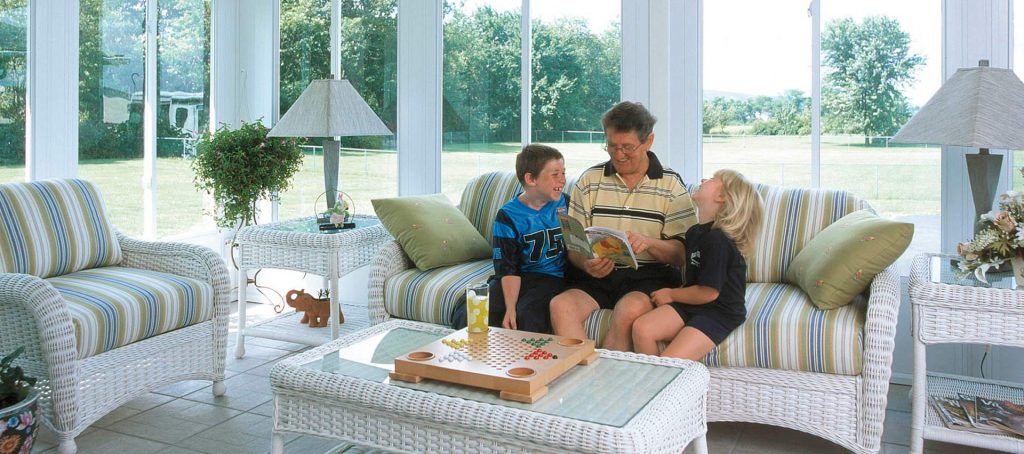
- Seasonal to true year round use
- Thermo- insulated solid roof
- Operating windows with full screens
- Privacy from outside noise
- Maintenance free
- Easily attaches to many styles of homes
A Solarium’s advantage is a complete enclosure of glass, an impressive structure, with a lot of glass. It's main advantage and selling features is an unobstructed view of your outdoor space and sky through a glass roof.
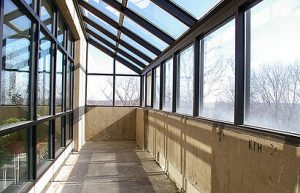 Solariums have some drawbacks though. The glass roof demands constant maintenance and cleaning due to the glass roof. Often, custom blinds are also needed for relief from the sun coming through the roof. The glass roof is also subject to seal failure and very energy inefficient compared to thermally insulated roof (remember heat rises). More, solariums cannot properly connect to many homes structurally or architecturally. Lastly, a glass roof can add considerably cost, sometimes more than twice as much as a sunroom.
Solariums have some drawbacks though. The glass roof demands constant maintenance and cleaning due to the glass roof. Often, custom blinds are also needed for relief from the sun coming through the roof. The glass roof is also subject to seal failure and very energy inefficient compared to thermally insulated roof (remember heat rises). More, solariums cannot properly connect to many homes structurally or architecturally. Lastly, a glass roof can add considerably cost, sometimes more than twice as much as a sunroom. Maintenance & Upkeep
Sunrooms:- Are virtually maintenance free.
- Easy to clean glass as needed.
- Four season sunrooms (also known as year round sunrooms) usually are built of vinyl, which insulates much better than other sunroom materials such as aluminum.
Solariums:
- The glass roof is next to impossible to keep clean unless you have a weekly cleaning service. Glass roof shows snow, ice, acid rain, birds, leaves, twigs, shingle residue, hail and more.
- Glass roof is highly subject to seal failure relative to the glass on the walls.
- Roof framing is typically constructed on high conductive aluminum and requires a painted finish, which will fade and wear over time.
Cost and Resale Value
Both sunrooms and solariums have a wide range of resale values due to the many variables and factors involved (different materials, quality of structure, custom designs, etc.)Sunrooms historically have a high ROI (return on investment). This is due to many factors include the sunroom usually has a lower cost than a full room addition; it’s relatively lower cost to add usable and desirable square footage. A sunroom will also make your home unique and it’s a very desirable amenity the home buyers want to have on their home. Most sunroom owners say “it’s the most popular room in the house”. Sunroom warranties are usually longer and better too; some are even full lifetime transferable warranties, which add to the value of the room because the next homeowner can enjoy a full warranty on the sunroom. Solariums add a little more “WOW” factor typically, but this comes at a steep price. Solariums are usually at least double the cost depending on the size and type of room, but there is also a lot more time and money needed for maintenance. Most solarium warranties are limited to ten years and are non-transferable, especially the glass warranties. If a solarium is what you really want, make sure you are aware of the glass replacement cost and procedure for the roof and any curved glass before selecting a contractor and ordering a solarium.
Whatever you decide, do your research and get advice from a sunroom/solarium company or manufacturer.
photo credit: Solarium

Tags
Subscribe to Joyce's Blog



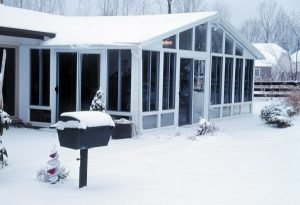
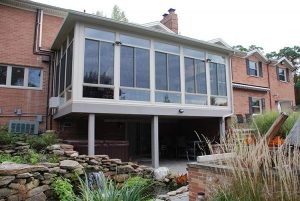
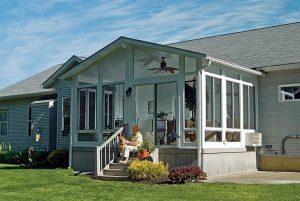

Comments